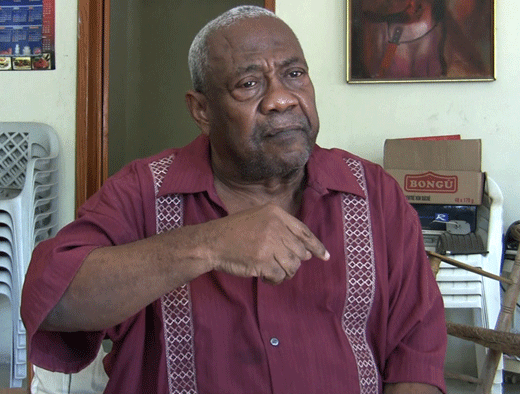Elections 2010
Anselme Remy on the 1990 elections
Haiti Grassroots Watch asked Professor Anselme Remy to explain why his political party – Movement of Workes and Peasants (MOP) – and other parties and organizations decided to enter the electoral system in 1990.
The 1990 electons, which resulted in an overwhelming victory for Jean-Bertrand Aristide, “were the crowning of my career,” he said.
But today, Remy doesn’t see things the same way.

Anselme Remy, former professor at Northeastern State University,
Clark and Fisk universities as well as the University of the District
of Columbia, and now a professor at the State University of Haiti's
Faculty of Human Sciences.
Asked for more details on how the parties and organizations that were part of the lavalas movement decided to participate in elections that were part of the “bougeois democracy” system.
“When we came back to Haiti, we came at a certain moment in time. Even if, personally, elections were not the the most important thing for me, since what was important was the radical transformation of Haitian society…
“But, despite the fact that if you have your dream, you have your plan, you still have to take into account what we call the objective reality. So, we were forced to compromise according to the political moment in which we were living… where the progressive forces were losing terrain in the face of imperialism.”
Remy said that organizations and political parties decided that the “struggle for bourgeois democracy might be able to attract the grand majority of the population, and after that, our hope was, with the contribution of a vanguard party, we could make what you might call a bourgeois democratic movement turn into ‘real democracy’ or ‘popular democracy.”
Haiti Grassroots Watch asked Remy how he felt about that decision today, 20 years later.
“It was an error,” he said.
“I don’t regret it, but there is one thing that is clear. It was an error. At the time, in the face of the gathering strength of imperialism, there was a tendancy to try to avoid was they were calling ‘extremism.’ Today, those same people would call you ‘terrorist.’ But at the time, it was ‘extremist,’ so everyone was trying to compromise.
“But in a compromise, there is supposed to be what is called ‘give and take,’ with someone giving and then someone taking. Well, in that so-called compromise, only one side was giving. It was the progressive forces because they wanted to avoid the label ‘extremist.’ The imperialists didn’t give anything. The imperialists took over the playing field.
"That’s why I say it was an error. We should have confronted the imperialists at that time. Now we live in a different time, but we should have confronted the imperialists at that time and, I don’t say we would have won, but the possibility of victory existed.”

